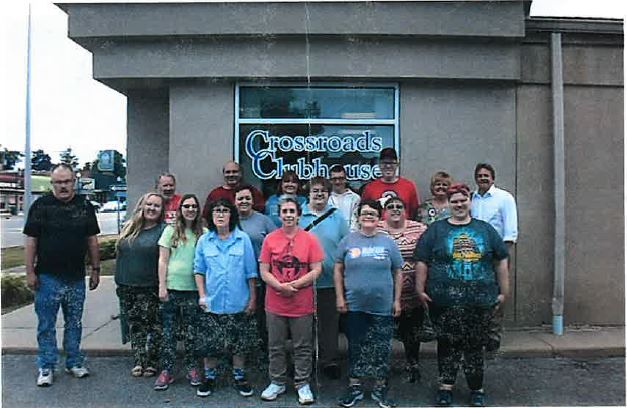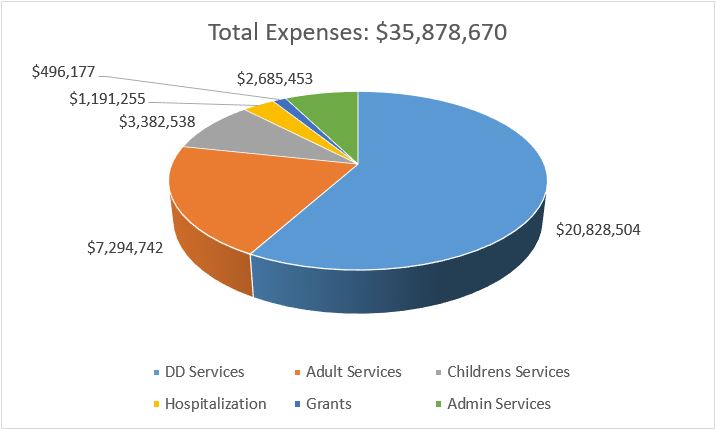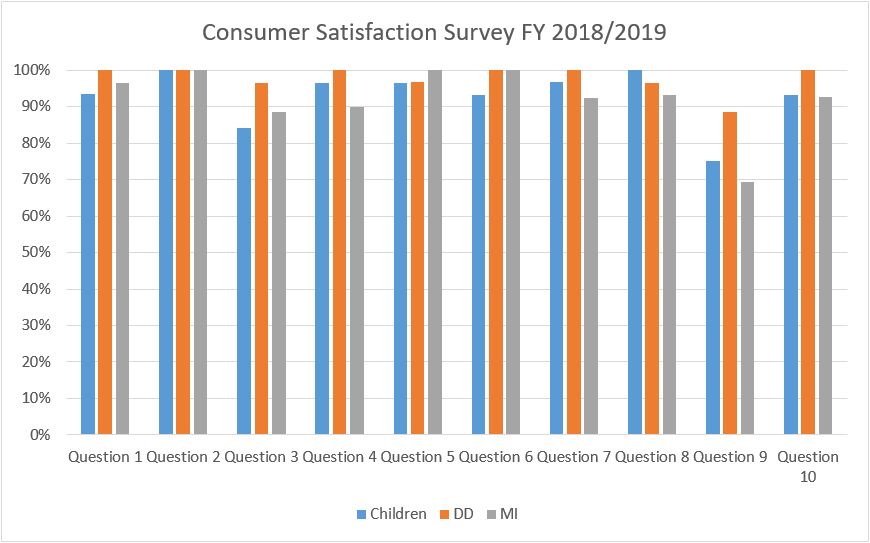MCMHA Annual Report
Crossroads Clubhouse
The Clubhouse Model is an evidence based practice that began in New York City in the 1950’s. The Club House model was founded by a group of recently discharged psychiatric patients who identified the need for community and encouragement to support recovery and life goals. The Clubhouse Model is based on the foundation of meaningful relationships in which Clubhouse Members and Staff complete the work of the Clubhouse side by side. Clubhouses are designed to prove that people who live with a mental health diagnosis should, can and do lead productive, fulfilled, and autonomous lives. With that belief in mind, Clubhouses provide members with the opportunity to return to work, pursue education goals and live a healthy and happy life.
Crossroads Clubhouse was recently awarded an accreditation status from Clubhouse International. This was the result of a year-long strenuous focus on evaluating compliance and adherence to the Clubhouse International Standards. To obtain this status the Clubhouse community had to prove fidelity to approximately 40 standards as set by Clubhouse International. As a result, the average daily attendance and active attendance of the program more than doubled. The Clubhouse supported several members in obtaining independent employment, and created two thriving transitional employment placements.
Community partnerships with local businesses and organizations are the cornerstone of the program and provide a foundation to support Clubhouse members in living fulfilled, healthy and autonomous lives. With the award of the accreditation the Clubhouse joined the ranks of 28 other accredited clubhouses in the state of Michigan, making Michigan the national leader for Clubhouses that have successfully been granted an accreditation status.

Mental Health Recovery Court
Monroe County was one of the first in Michigan to adopt a resolution under the Stepping Up Initiative to Reduce the Number of People with Mental Health diagnoses in the Jails. In 2015 Monroe County joined 11 other counties and 302 nationally to take this step to pursue jail diversion programing. Monroe County developed and has implemented both a jail diversion program and a mental health recovery court to better support and serve Monroe County residents. Monroe’s Jail Diversion program was established to assist those with mental health diagnoses through community treatment, jail diversion programming both in the community and during incarceration, education and the opportunity to participate in specialty mental health recovery courts. Monroe County first launched Mental Health Recovery Court in 2016 with First District Court Judge Jack Vitale as the presiding judge for the court. Mental Health Recovery Courts are team efforts, in Monroe county including: Monroe Community Mental Health Authority, Monroe County Prosecutor’s Office, City Attorney, Sherriff’s Office, District Court Probation and a County Defense Attorney. Mental health recovery courts in Michigan have been established since the late 2000’s.
In fiscal year 2018, mental health recovery courts expanded, totaling 33 active programs including 27 adult mental health recovery courts and 7 juvenile mental health recovery courts. Mental health courts were developed in response to the overrepresentation of individuals with diagnosis of mental illnesses in the criminal justices systems. Mental health recovery court diverts select defendants with a mental health diagnoses into judicially-supervised, community based treatment. The court is designed to assist individuals who have a mental health diagnoses to work on their personal recovery and increase engagement in criminal activity due to their mental health diagnoses. The purpose of mental health recovery court is to connect defendants with comprehensive and individualized mental health treatment in Monroe County. The program ranges from 16 to 24 months. For those who agree to the terms and conditions of community-based supervision, a team of court staff and mental health professional’s work together to develop individualized treatment plans. Participants appear at regular status hearings during which incentives are offered to encourage adherence to court conditions, sanctions for nonadherence are handed down and treatment plans and other conditions are periodically reviewed.
Monroe County Mental Health Recovery Court as of January 1, 2019 has 27 individuals actively participating in the program. Monroe has held two graduation ceremonies that included 8 Monroe County residents successfully completing and graduating from the Monroe County Mental Health Recovery Court program. One of the Monroe County Mental Health Recovery graduates identified at the May 2019 graduation ceremony, “I want to thank the team and everyone in the mental health recovery court, without all of you pushing and supporting me, I don’t’ think that I’d be here today.”
Mental health court programs have reported favorable outcomes, as cited in the Michigan Problem-Solving Courts Performance and Outcomes report, published by SCAO. In 2018, it was identified that nearly 100% percent of those who participate in the program improve their quality of life, unemployment among mental health court graduates was cut by more than half, nearly 100% of juvenile mental health court graduates improved their education level, nearly 100% percent of those who participate improve their mental health and nearly 100% percent of those who participate were compliant with mental health treatment.
Recipients Rights
Last April the State Office of Recipient Rights conducted an audit of our agency’s Recipient Rights system. This audit is conducted every three years and reviews all aspects of the Rights system, including agency policies/procedures; protection of rights by staff/contracted providers, timely reporting of suspected violations and corrective action when violations occur; and the operations of the Rights Office to ensure compliance with legal requirements.
The auditors spent three days reviewing our Rights Office and system and determined the agency was in FULL (100%) compliance with required standards. This is a testament to the diligence of our staff/contracted providers, the functioning of our Rights Office, and the agency’s commitment to ensuring rights protection for those we serve. We have truly embodied the moto: Rights is Everybody’s Business!

Staff Recognition
Yolanda exudes passion, energy, and commitment. She has served families in our community doing home based work for 10 years!! We often call her the unicorn because she is always in the field and a siting of her at the office is a very rare find. Throughout her time at Monroe Community Mental Health Authority she has learned several evidenced based practices (like PMTO and TFCBT) and continues to grow in her knowledge base and recognizes the value in sound clinical skills.
Yolanda’s ability to ‘go with the flow’ and adapt to change is indispensable. She is an invaluable member of the Home Based team and is a wonderful teacher to newer staff. She brings laughter and joy into all of her interactions at MCMHA. She exudes confidence in all things: outfit choices, therapeutic sessions, crisis situations, and relationships. She is open to hearing and digesting feedback and is open to explore change.
Beyond all of the clinical knowledge is an uncanny ability to develop relationships with the families she serves. She has a special way of building relationships with the families that propels them into taking positive steps towards change. She often refers to this as her, “Spidey senses.” She is able to see people, hear people, listen to her gut, and respond in a way that makes them feel known and validated.
Her families feel incredibly supported and valued. She is kind, thoughtful, and humble. She is never rattled and handles everything in stride, which helps families and peers feel calm when they are in her presence. Yolanda truly has everything that makes a wonderful and effective home based clinician and we are so grateful to have her in Monroe County.
Consumer Satisfaction Survey
- Question 1 – I feel the agency is a comfortable place
- Question 2 – I feel respected when I call or see my CMH staff
- Question 3 – My phone calls are returned by the next day
- Question 4 – I saw my CMH staff within 15 minutes of my appointment
- Question 5 – I decide what is important when working with my CMH staff
- Question 6 – I understood what my CMH staff said today
- Question 7 – My CMH staff helps to achieve my goals.
- Question 8 – My CMH staff follow up about my physical health needs
- Question 9 – I feel able to complain or disagree with my CMH staff
- Question 10 – I know how to file a complaint
Board of Directors
- Charles Londo – Chairperson
- Susan Fortney – Vice Chairperson
- Sandy Libstorff – Secretary
- David Stephens
- Dawn Asper
- Gloria Rafko
- Jim Neumann
- John Burkardt
- Kandie Collier
- Pam Ray
- Randy Richardville
- Rusty Shorter




